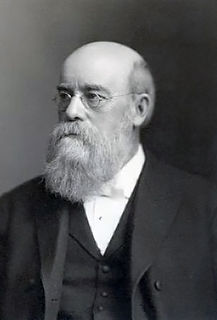A Quote by Oliver D. Crisp
Here is the interesting twist:[McLeod] Campbell came to his views through reading Jonathan Edwards who suggested at one point in his ruminations on the atonement that Christ could have offered up a perfect act of penitence instead of punishment, and that this would have been an acceptable offering suitable to remit our sinfulness.
Related Quotes
For instance, the notion of non-penal substitution. This idea, found in the work of the nineteenth century Scottish Reformed theologian John McLeod Campbell and based upon his reading of the letter to the Hebrews in particular, is that Christ offers up his life and death as a penitential act on our behalf, rather than as a punishment in our stead.
[John] Calvin is revered as a thinker of immense importance in Reformed thought, Jonathan Edwards could say in his preface to his treatise on Freedom of the Will that he had derived none of his views from the work of Calvin, though he was willing to be called a "Calvinist" for the sake of convention.
Jesus Christ was the only one capable of performing the magnificent Atonement because He was the only perfect man and the Only Begotten Son of God the Father. He received His commission for this essential work from His Father before the world was established. His perfect mortal life devoid of sin, the shedding of His blood, His suffering in the garden and upon the cross, His voluntary death, and the Resurrection of His body from the tomb made possible a full Atonement for people of every generation and time.
The idea of being the Substitute in offering an atonement to satisfy the demands of God’s law for others was something Christ understood as His mission from the moment He entered this world and took upon Himself a human nature. He came from heaven as the gift of the Father for the express purpose of working out redemption as our Substitute, doing for us what we could not possibly do for ourselves.
The plan of salvation could not be brought about without an atonement... The atoning sacrifice had to be carried out by the sinless Son of God, for fallen man could not atone for his own sins. The Atonement had to be infinite and eternal to cover all men throughout all eternity. Through His suffering and death, the Savior atoned for the sins of all men. His Atonement began in Gethsemane and continued on the cross and culminated with the Resurrection.
Our Father in Heaven loves all of His children and desires that they know and understand His plan of happiness. Therefore, He calls prophets, those who have been ordained with power and authority to act in God’s name for the salvation of His children. They are messengers of righteousness, witnesses of Jesus Christ and the infinite power of His Atonement. They hold the keys of the kingdom of God on earth and authorize the performance of saving ordinances.
It is Christ's atonement that makes it possible for us to be forgiven of our sins and His resurrection that gives us the assurance of immortality and the life to come. It is that life to come that orients our views in mortality and reinforces our determination to live the laws of God so that we can qualify for His blessings in immortality.
Trust wholly in Christ; rely altogether on His sufferings; beware of seeking to be justified in any other way than by His righteousness. Faith in our Lord Jesus Christ is sufficient for salvation. There must be atonement made for sin according to the righteousness of God. The person to make this atonement must be God and man.
He who is accustomed to give account of his life at confession here will not fear to give an answer at the terrible judgment-seat of Christ. It is for this purpose that the mild tribunal of penitence was here initiated, in order that we, being cleansed and amended through penitence here below, may give an answer without shame at the terrible judgment-seat of Christ.
If you were good enough, there would be no need of confessing Christ at all. It is just because you are not good enough, that Christ says to you, "Follow me." He came not to call the righteous, but sinners to repentance. It is not the perfect people whom He wants in His church, but those who have a deep sense of their own imperfection, and who believe that His strength is made perfect in weakness.
Believe in Jesus Christ, our Savior and our Redeemer, the Son of God, who came to earth and walked the dusty roads of Palestine - the Son of God - to teach us the way of truth and light and salvation, and who, in one great and glorious act offered an atonement for each of us. He opened the way of salvation and exaltation for each of us, under which we may go forward in the Church and kingdom of God. Be not faithless, but believe in the great and wonderful and marvelous blessings of the Atonement.
Prayer is the converse of the soul with God. Therein we manifest or express to Him our reverence, and love for His divine perfection, our gratitude for all His mercies, our penitence for our sins, our hope in His forgiving love, our submission to His authority, our confidence in His care, our desires for His favour, and for the providential and spiritual blessings needed for ourselves and others.































